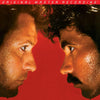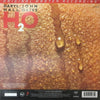









Daryl Hall and John Oates - H2O (Ultra Analog, Half-speed Mastering)
ORDER LIMITED TO ONE ITEM PER CUSTOMER
[click here to see more vinyl featuring Daryl Hall & John Oates]
Daryl Hall – lead vocals (A1-B1, B3-4, B6), backing vocals, keyboards, synthesizers, guitars
John Oates – backing vocals, lead vocals (B2, B5), 6 and 12-string guitars, electric piano, Roland CR-78, Linn LM-1
Larry Fast – synthesizer programming
G.E. Smith – lead guitars
Tom "T-Bone" Wolk – bass guitar
Mickey Curry – drums, percussion
Charlie "Mr. Casual" DeChant – saxophone
"Little Italy Mandolinos" – Daryl Hall, John Oates and Tom "T-Bone" Wolk
1 LP, gatefold jacket
Limited numbered edition
Original analog Master tape : YES
Half-speed Mastering
Gain 2™ Ultra Analog
Heavy Press : 180g
Record color : black
Speed : 33 RPM
Size : 12'’
Stereo
Studio
Record Press : RTI
Label : MOFI
Original Label : RCA
Recorded 1981–82 at Electric Lady Studios, New York City
Engineered & mixed by : Neil Kernon
Produced by Daryl Hall + John Oates
Remastered by Krieg Wunderlich, Rob LoVerde
Originally released in 1982
Reissued in 2014
Tracks:
Side A :
Side B :
Reviews :
"Private Eyes solidified Hall & Oates' status as one of the most popular acts in America in the early '80s, and with 1982's H2O, they capitalized on its success, delivering an album that turned out to be bigger than its predecessor, as it climbed higher on the charts and launched three Top Ten singles with "Maneater," "One on One," and "Family Man." Bigger isn't necessarily better, though, and in comparison to the glistening pop of Private Eyes, H2O pales somewhat, coming across as a little too serious, with its ambitions just being a little too evident. Take the claustrophobic, paranoid "Family Man" -- covering an art rocker like Mike Oldfield suggests a far different agenda than crafting a tribute to the Temptations, and while "Family Man" isn't as key to the album as "Looking for a Good Sign" was to Private Eyes, it does indicate the relatively somber tone of H2O. Not that the album is a tortured dark night of the soul -- how could it be, when John Oates kicks off the second side with the proudly silly "Italian Girls"? -- but the production and performances are precise and deliberate, effectively muting the pop thrills that spilled over on its predecessor. Even if the album was recorded with Hall & Oates' touring band -- something that the duo and their co-producer Neil Kernon confirm in the excellent liner notes by Ken Sharp in the 2004 reissue -- H2O feels as if most songs were cut to a click track, and are just slightly too polished for their own good; when the productions open up a bit, the band still sounds terrific, but they never are given the opportunity to sound as big and bold as they do on Private Eyes. This, coupled with a few drawn-out duds (such as the vaguely atmospheric "At Tension") means H2O isn't quite as sharp and bracing as anything the duo had released since X-Static, and the fact that two of the best moments are huge hits -- the prowling "Maneater" and "One on One," perhaps the most seductive song Daryl Hall ever wrote -- may suggest that this is closer to singles-plus-filler than it really is. The best of the rest of H2O reveals that Hall & Oates are at a near-peak in their creativity, writing tuneful, soulful fusions of pop, soul, and new wave. "Crime Pays" has an appealing robotic synth pop groove, "Art of Heartbreak" rides a tense guitar line to a great horn line on the chorus, the jealous anthem "Open All Night" slinks by on a stylized late-night groove, "Go Solo" hails back to Hall's arty Sacred Songs, and "Delayed Reaction" is a sterling piece of propulsive near-power pop. Even if they don't gel into an album as strong as Voices or Private Eyes, they're pretty terrific pop in their own right. They're not just evidence that Hall & Oates' popularity in the early '80s was earned and well deserved, they hold up very well decades after H2O ruled the charts." AllMusic Review by Stephen Thomas Erlewine
Ultra Analog™ : The GAIN 2 Ultra Analog™ Series stems from the use of the Gain 2 system, mastered at half speed from the original master tapes where possible, capturing and uncovering as before undiscovered sonic information.
Half-speed mastering. In half-speed mastering, the whole process is slowed down to half of the original speed. A typical 33 1/3 rpm record is cut at 16 2/3 rpm. The source material is also slowed down (reducing the pitch in the process) meaning the final record will still sound normal when played back. Slowing the whole process down allows more time, which means the end result sounds better and is more efficient — allowing engineering to minimize the effects of inherent limitations within the vinyl format. The result is a more accurate and more open high-frequency response in the half speed vinyl when compared with a normal speed recording.
Ratings :
AllMusic : 4 / 5 , Discogs : 3,82 / 5


